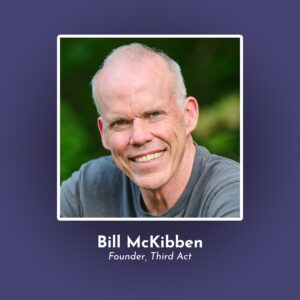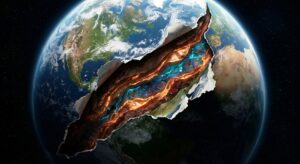
Show Summary
On this episode, environmental activist and author Bill McKibben joins Nate for a reflection on the last few decades of climate education and movements – and the possibilities and challenges that we’ll face ahead. Among a system that is dependent on growth and embedded in a biosphere full of limits (which we continue to surpass), working towards shifting our societies to be ecologically balanced is potentially the most important mission to which an individual can contribute – yet this is much easier said than done. What have been the largest barriers towards actual effective climate action since emissions have continued in a straight line up since the 20th century? What power structures stand as a barrier to proactive initiatives, and which ones could we utilize to propel movements forward? How can we prepare and organize at the individual, community, and national levels, as we look ahead to climate – and other – challenges we’re likely to face in the coming decades?
About Bill McKibben
Bill McKibben is founder of Third Act, which organizes people over the age of 60 for action on climate and justice. His 1989 book The End of Nature is regarded as the first book for a general audience about climate change, and has appeared in 24 languages. He’s gone on to write 20 books, and his work appears regularly in periodicals from the New Yorker to Rolling Stone. McKibben helped found 350.org, the first global grassroots climate campaign, which has organized protests on every continent, including Antarctica, for climate action. He played a leading role in launching the opposition to big oil pipeline projects like Keystone XL, and the fossil fuel divestment campaign, which has become the biggest anti-corporate campaign in history.
In French, we have a motto that says that a simple drawing is often better than a long explanation. Jean-Marc Jancovici Carbone 4 President
That’s very understandable because with left atmosphere thinking, one of the problems is that you see everything as a series of problems that must have solutions. Iain McGilchrist Neuroscientist and Philosopher
We can’t have hundreds and hundreds of real relationships that are healthy because that requires time and effort and full attention and awareness of being in real relationship and conversation with the other human. Nate Hagens Director of ISEOF
This is the crux of the whole problem. Individual parts of nature are more valuable than the biocomplexity of nature. Thomas Crowther Founder Restor
Show Notes & Links to Learn More
Download transcript00:00 – Bill McKibben works + info, Third Act
02:27 – CO2 emissions per year over time
02:52 – The End of Nature
03:52 – Herman Daly
04:15 – Climate science has long been understood
04:17 – Ocean acidification
07:30 – Fossil Fuel Company disinformation
07:45 – James Hansen Congress Testification
09:01 – Tobacco industry misinformation
13:01 – Rapid decline in the price of renewable energy
13:42 – Energy demand increasing faster than we’re scaling renewables
14:23 – Highest temperatures ever in 2023, stepped across 1.5 and 2 degree barrier
15:15 – Installing 1 GW of renewable capacity/day
16:33 – US Demand for fossil fuels
16:56 – US fossil fuel production grew in 2023, increase in exports via LNG exports
18:17 – US expansion of LNG would produce more greenhouses gasses than everywhere in Europe
19:08 – Portugal has lots of renewables but 20% energy poverty
19:25 – Global south expanding fossil fuel infrastructure
21:22 – Solar electricity cost
22:29 – The bulk of the world’s money is in US pension funds
24:36 – Law against propane stoves
30:13 – Canadian wildfires, carbon emissions
31:31 – Lifetime of solar and wind technologies, rematerialization
32:45 – 40% of ship traffic is carrying coal and gas
34:55 – Slow down of AMOC
36:02 – Don’t Look Up
39:04 – ⅔ of Americans understand climate as a serious issue
39:39 – Inflation Reduction Act
41:37 – Importance of a frozen arctic
45:35 – Energy surplus have made community optional
47:05 – Decentralized energy, democracy
48:40 – 9 million deaths per year are attributed to breathing in fossil fuel particulates
50:35 – Aldo Leopold
53:05 – Importance of eating locally
54:12 – Clean Air Act, Clean Water Act
54:44 – Watergate
55:12 – January 6th
57:07 – IPCC, we need to cut emissions in half by 2030
57:53 – Private fossil fuel companies are only 13% of fossil industry
58:35 – Rise in authoritarianism
59:06 – Nate’s work on AI
1:01:53 – Everything is connected to the flow of the energy from the sun
1:02:39 – Beyond Plastics
1:04:51 – Increasing consumption isn’t connected to happiness
1:05:20 – E-bikes
1:05:58 – We’re adding *70 million vehicles to the planet every year
1:15:05 – Structural power of the older generations
1:17:35 – Most young people believe in climate change, regardless of political affiliation






